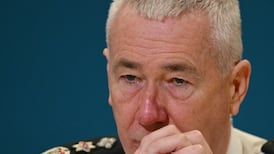Important information circulating within An Garda Síochána about the extent of the covert system used by the Garda to illegally record calls to stations was not shown to the then Garda commissioner Martin Callinan for several months.
It meant the most senior officer in the force made important decisions and briefed the Attorney General with only partial information and little understanding as a serious justice and policing crisis was growing.
Ironically, the officer who made the first steps – in October 2013 – to establish the extent of the problematic practice when the first tapes were found in Bandon Garda station was then deputy commissioner Noirín O’Sullivan.
When news of the widespread recording system became known to Taoiseach Enda Kenny six months later, an under-pressure Martin Callinan retired as Garda commissioner.
It was O’Sullivan, as the only deputy commissioner in the force at the time, who was then elevated to the post of interim commissioner, which she was later awarded on a permanent basis.
The interim report by the Fennelly commission into the circumstances of Callinan’s sudden retirement in March 2014 has revealed significant communication breakdown involving O’Sullivan, as well as other key Garda personnel.
On October 17th, 2013, then deputy commissioner O'Sullivan – with responsibility for operations – was contacted by Chief Supt Tom Hayes in Cork.
He informed her of the discovery of recordings in Bandon garda station relating to the Sophie Toscan du Plantier murder inquiry.
Summary
The find was made during the discovery process when the one-time suspect in the case,
Ian Bailey
, was suing the Garda for unlawful arrest, false imprisonment and other claims.
O'Sullivan immediately sought information from the Garda's chief administrative officer, Cyril Dunne, and head of ICT Liam Kidd, another civilian working for the force.
Supt Michael Flynn of the Garda's ICT department was asked to set out the extent of and history of the recording system in a report.
His summary confirmed the equipment had been installed as far back as the 1980s and, among other details, that the system was based in 23 Garda stations in divisions across the State. That summary was emailed by Supt Flynn to O’Sullivan on October 18th, with Kidd and Dunne copied on the email.
The commission said while that summary report contained some inaccuracies, it was extensive for that stage of the emerging crisis.
It also noted that the Garda’s head of legal affairs, Kenneth Ruane, was prompted by O’Sullivan to prepare and send a memo to her on October 29th, 2013, on the wider issue of covert telephone recording.
In that memo, he had flagged “data protection issues” around the covert recording of people without “a sound, clear and legitimate purpose for doing so”.
The commission concluded of the memo: “It would seem that Mr Ruane’s memo on data protection was not brought to the attention of Commissioner Callinan at this time.”
The commission further noted that deputy commissioner O’Sullivan and chief administrative officer Dunne were “considered of equal rank”.
This was despite Dunne being a civilian rather than Garda member. Each reported directly to Callinan.
When considering the reasons why Supt Flynn’s report in October 2013 was not sent to Callinan, the commission found: “In this instance, it appears that each (O’Sullivan and Dunne) was of the view that responsibility for briefing the commissioner on the recordings issue as it developed lay with the other.”
Callinan was unaware of key facts known to others in the Garda until just before his retirement in March 2014, some six months after the crisis began.
This included the fact there was sound rationale around the initial installation of the recording systems and what that rationale was – to record bomb threats and other code messages during the Troubles.
Callinan was also unaware that recordings only took place at command and control in Dublin and in divisional headquarter stations outside Dublin; a maximum of 23 stations.
He was also never informed that system was replaced with digital audio tapes in the mid-1990s.
He briefed key figures in the Attorney General’s office without this information and was unaware of it.
This was despite it being available in several reports, generated by Supt Flynn in October 2013 in Garda headquarters, which he was not shown.
In a section dealing with how Callinan kept then minister for justice Alan Shatter and then Department of Justice secretary general Brian Purcell informed of events, the commission noted: "It should be stated that the Garda Commissioner cannot effectively perform his obligation to report to the secretary general and to the minister . . . unless he himself is adequately informed by his colleagues.
Retired
“The commission has noted several failures of internal communication in An Garda Síochána, most notably that the commissioner was unaware of any of Superintendent Flynn’s reports of 18th, 22nd and 25th October 2013, when he attended the office of the Attorney General on November 11th, 2013.”
Elsewhere, the commission concludes: “The commissioner was not adequately informed by his management team regarding the details of the telephone recording issue.”
While there are two deputy commissioner posts in the Garda, during the full six-month period of the tapes crisis, O’Sullivan occupied both posts after a colleague who retired was not replaced.
It meant from the time it became known in the autumn of 2013 that calls to Garda stations had been covertly recorded since the 1980s, Callinan was Garda commissioner with Ms O’Sullivan just below him as the sole deputy commissioner; the second most senior policing post in the Garda.










